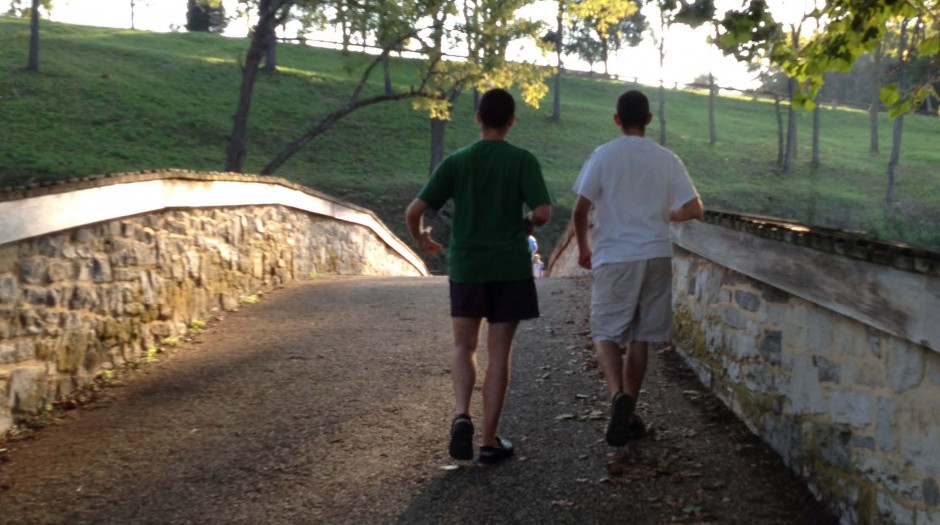As with many things in life and autism, as I blather excitedly to others about our hiking NH’s 48 Four Thousand Foot peaks accomplishment, there are those who get it and those who don’t. I think about that today, several weeks afterwards, during a rainy weekend where I’d far rather be hiking than dusting the living room. I think about it also as the daily struggle to gain capabilities continues, and we do the work that gets us to the peaks -the over and over again repetition that builds capability.
The “get it” camp among those who reveled in our hiking joy included the boys’ longtime therapists who have watched them gain capabilities, which is really rewarding, and some neighbors and family members. One neighbor even baked us a cake afterwards to celebrate.
The “don’t get it” camp unfortunately at present included most of their teachers, which is a sad statement on which I could riff for a few hours. The “don’t get its” also includes a few uber-hikers that I admire among the various online groups in which I participate, which I suppose saddens me, but also gives me pause to examine my own motives as well as expectations.
As a spectrum disorder I suppose one has to know autism and its particular expression in a given individual to understand any accomplishment. So much media airtime is expended on advocating inclusion for autistic individuals and convincing neurotypicals that jobs, gainful community roles and living settings are possible and indeed contribute to society.
Unfortunately for those of us who were given “Classic Autism” ie lower functioning individuals – in my case that means W. and J. cannot read, struggle to count and perform basic activities of daily living – it’s not so easy. Most assuredly W. and J. belong in their world, and make it a better place. However their capabilities are very limiting on the job or for independent living. W. continues to do wonderfully at his shredding job at a sheltered workshop, however by definition it is not competitive employment like bagging groceries (which I wonder if he could ever do). Most decidedly, W. needs the supports of the staff at his shredding job to remember basics like “when the red light comes on the machine is jammed so you have to stop” and such – even after at least 9 months of working intensely on such skills.
J. on the other hand has such profound sensory issues that work environment overload spawns either bouts of nonfunctional vocalization (once called “whale noises” by an S/LP we met vacationing at a hotel) or bouts of slapping himself rhythmically. His vocationally oriented school has not yet found a job setting where Jeff functions well after about 2 years of various rotations. At home with support I see him function beautifully while painting, and he’s also done wonderfully albeit with 1:1 support at a local bakery where he scrapes then greases about 100 cake pans each week prior to baking. But it’s been hard to build the requisite preparation skills and independence around these roles – not impossible of course, but a lofty peak to climb on which we are still early in the ascent.
My lower-functioning guy’s challenges brings up the topic of their life path and where they’ll fit in the world after us. Yesterday’s Boston Globe carried a story on abuses at a group home chain where 3 adults have died in the past 18 months. Truly I couldn’t bring myself to read more than the first 4 paragraphs.
The road is long, yes. At present I also struggle with my own limitations as full-time work demands, a profession of “can you top this” in ridiculous expectations, and the increased demands of my aging body like the need to stretch and sleep in ways I could formerly skip. Always I feel insanely sad and “bad mother” like when I can’t accomplish all the 30 boys’ action items I put on my To Do List each day. The rain has made this weekend about chores and organization, not hikes, which also inspires my feeling rather cheated and sad. The road is long indeed, and I am human.
But thanks to this summer I have a new mental image:
This is W., the child who couldn’t go more than 100 yards when we started hiking without a sit down protest and a promise of a reward. The child who took insanely long to plan the next step. The child who’d ask to go home after 10 minutes.
This is W. journeying independently home.
On my crappiest days, I know I made this happen, and it gives me intense joy.
We stumble, struggle and sometimes fall as parents of special kids, but the path to capability journeys upward always. If you set your child’s goals low, you will achieve them. If you look to new heights – you will go above and beyond, and may even surprise yourself.
Onward!

